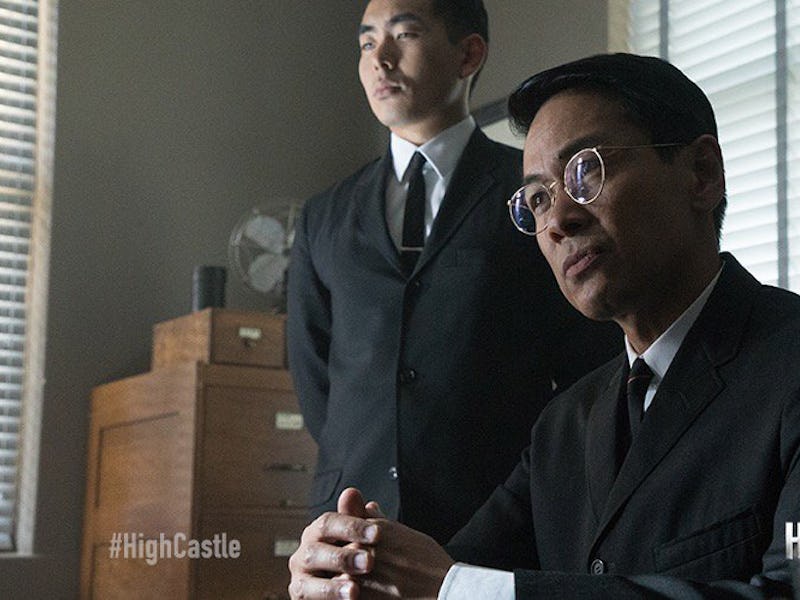Yes, 'Man in the High Castle' Gets Way Better at the End, but Reveals Deeper Failings
Action finally ramps up in the Amazon show's final third, but doesn't place enough faith in its audience.

In the past couple of days, Amazon original series The Man in the High Castle has been in the news for the controversy it has stirred up attempting to draw NYC subway-goers into its unsettling alternate universe, as much as for its actual content. Indeed, the issue of the Nazi-emblem-studded ad campaign is probably more interesting than the series itself. But it is worth noting that Man in the High Castle gets better than its suggestive void of a exposition and body — which we’ve previously examined here. It has moments near its end and peruses some more interesting conceits, as actions ramp up to the possible incitement of war between Japan and Germany, and Hitler’s overthrow by hawkish German insurgents.
In the context of this action, showrunner Frank Spotnitz and his team apply themselves more earnestly towards lending a human element to the most unlikely characters: most successfully, Long Island-dwelled stateside Nazi leader John Smith (Rufus Sewell) and the head cop of Japan’s “Pacific States, Chief Inspector Kido (Joel de la Fuente). As others in their radius angle for more bloodshed, they fight to preserve peace, even at the risk of their own life — with Smith, Spotnitz goes straight for the tear ducts as the Nazi leader contemplates his preteenage sons’ mortality in the face of an incurable disease.
We could have a long think about the attendant issues with humanizing a fantasy-world Nazi character who remains unrepentant for his prejudices — and I’m sure Googleable people out there have and will. But somehow debating that feels much too glaringly like what the show desires us to do. “Subtlety” and “controversy” become overt devices unto themselves, as if “moral ambiguity” should be abbreviated “MA” and put up next to “Graphic Violence” and “Brief Nudity” on the show’s opening rating screen.
To draw our attention to these issues, there is extensive postulating — especially from traitorous Nazi colonel and philanderer Rudolf Wegener — about what it means to be a “good man.” Wegner’s thesis? It’s harder and harder to know how to be one, in trying times, all one can do is try. With certain what-kind-of-a-man-is-this characters, Spotnitz really fails to stir our emotions or critical thinking on any level. The destiny of Nazi double agent Joe Blake (Luke Kleintank), in particular, remains impossible to care about. The character is hard to regard as anything more knotty than a coward and snake-in-the-grass; to be fair, some of this is a problem with the acting, not the writing.
In the final act, many characters that had seemed vacuous approach interesting, but eventually they are yanked away from us, and fully subsumed by their role in furthering the increasingly dense plot. As events spiral exhilaratingly out of control and become more engaging, the show’s patness of purpose provides a distracting contrast. Japanese trade minister Tagomi (Cary-Hiroyuki Tagawa) constantly fingers a heart necklace, as if desperately willing it into being a resonant symbol. A cartoonish Hitler (Wolf Muser) appears as something of a deus ex machina — the evil but necessary arbiter of world peace. In a final scene, Juliana and Joe’s conversation about the importance of the predictive, much-coveted films — and their indeterminate origin — hammers home the possibility that man can change the course of future events, and that the factions battling for possession of the films may be investing them with significance that is not there. As Wegener puts it in conversation with Adolf: “Fate is fluid, destiny is in the hands of men.” One wishes Spotnitz and Co. would have trusted the viewer a bit more to infer this for themselves.
Slate’s Laura Miller and I have both commented extensively on what the show gets wrong in Philip K. Dick’s style, as a way of getting at why the show is so underwhelming. But the real issue with The Man in the High Castle, ultimately, is its internal inconsistency in tone and vision. Spotnitz’s show toys with Dick’s interesting themes — playing a bit with the idea of fate as postulated by the I Ching — but homogenizes them. It attempts to wrap his crew of repressed anti-heroes in a neat package, and invest their storylines with high drama which is not always there. In the case of something like Mozart in the Jungle, the model of a slightly sloppy show that works through whatever-the-fuck-it-is-supposed-to-be over its duration is charming. It’s much less so in Castle, which wants for any signs of self-awareness. One wonders if this freewheeling approach to editing and corner-cutting will prove to be a recurring theme in future Amazon programming.
Luke Kleintank and Alexa Davalos, 'Man in the High Castle'
This is just another argument for why they should seriously consider programming potential new series Edge, and getting away from attempts at prestige BS.